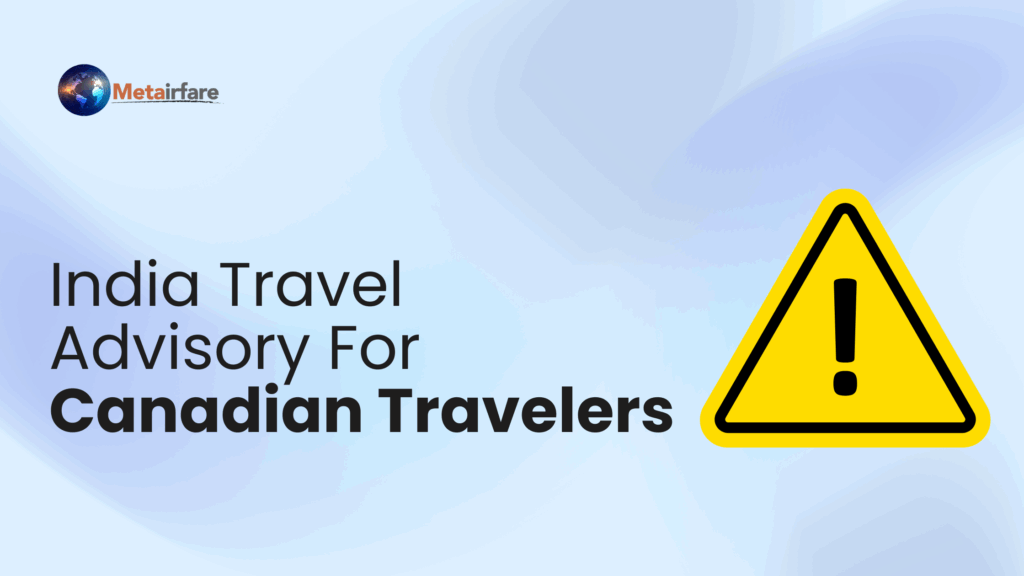
Key Takeaways
- The India travel advisory advises caution due to regional security risks.
- Canadian travelers need a visa and should be aware of local health requirements.
- Indian authorities also issue a travel advisory to Canada from India, especially during diplomatic tensions.
- Stay informed, follow local laws, and register with Canadian consular services for safety.
- Both advisories are important to monitor for smooth bilateral travel between India and Canada.
As global travel rebounds, many Canadians are once again considering vibrant destinations like India. With its rich cultural heritage, bustling cities, diverse landscapes, and historical landmarks, India remains a top choice for travelers seeking adventure and discovery.
However, before booking your trip, it’s essential to stay informed about the latest India travel advisory updates to ensure a safe and smooth experience. This article provides a comprehensive overview of the India travel advisory issued for Canadian citizens, including entry requirements, safety precautions, and bilateral advisory considerations such as the travel advisory to Canada from India.
Understanding the Current India Travel Advisory for Canadians
As of 2025, Global Affairs Canada advises all travelers to exercise a high degree of caution when traveling to India due to the risk of terrorism, civil unrest, and crime in some regions. While the majority of visits to India are trouble-free, travelers must be mindful of regional security conditions.
The India travel advisory includes specific notes for certain states:
- Jammu and Kashmir: Avoid all travel due to the threat of terrorism, militancy, and civil unrest.
- Northeastern states: Some areas experience periodic insurgency-related violence; avoid non-essential travel to Manipur and parts of Assam.
- Border areas: Be cautious near India’s borders with Pakistan and China due to military tensions.
In general, major cities like Delhi, Mumbai, Bengaluru, and tourist hotspots like Goa, Rajasthan, and Kerala are considered safe with standard precautions.
Visa Requirements and Entry Conditions for Canadian Travelers
Canadian passport holders require a valid visa to enter India. The Indian government offers an e-Visa system for tourism, business, and medical visits, which must be obtained prior to arrival. The process is typically completed online, but it’s crucial to ensure all details match your passport to avoid denial of entry.
Travelers must also meet the following requirements:
- Passport validity for at least six months beyond the date of arrival
- Two blank pages in the passport
- Return or onward travel tickets
- Sufficient funds for the duration of stay
COVID-19-related restrictions have eased, but it’s advisable to verify any health or vaccination requirements before departure. Canadian travelers should register with Global Affairs Canada’s Registration of Canadians Abroad program for safety updates.
Health and Safety Considerations
While the India travel advisory doesn’t mandate vaccinations for entry, the following immunizations are recommended:
- Hepatitis A and B
- Typhoid
- Japanese Encephalitis (for rural areas)
- Rabies (especially if you’ll be in contact with animals)
- Routine vaccines (MMR, tetanus, etc.)
Travelers should also consider purchasing comprehensive travel insurance that covers medical emergencies, theft, cancellations, and evacuations.
Women travelers are advised to take extra safety precautions, especially when traveling alone. Avoid isolated areas after dark, use registered taxis or ride-sharing apps, and dress modestly in rural or conservative regions.
Currency, Connectivity, and Local Etiquette
The official currency in India is the Indian Rupee (INR). Credit cards are widely accepted in urban areas, but cash remains essential in rural towns and markets. Currency exchange is available at airports, banks, and licensed money changers.
India has widespread mobile network coverage, and tourists can easily purchase local SIM cards with data packages. Wi-Fi is commonly available in hotels, cafés, and airports.
Understanding cultural norms will enhance your travel experience:
- Remove shoes before entering homes and temples
- Use the right hand for eating and giving/receiving items
- Dress modestly, especially in religious or rural areas
- Public displays of affection are frowned upon in many places
Travel Advisory to Canada from India
While Canadian travelers focus on the India travel advisory, it’s equally important to note the travel advisory to Canada from India. The Indian government issues its own guidance for Indian nationals traveling abroad, including Canada. In recent years, advisories have highlighted:
- Rising incidents of hate crimes and discrimination
- Visa processing delays or denials
- Protests or diplomatic tensions impacting travel
Although Canada remains a favored destination for Indian students and tourists, political developments or bilateral tensions can influence travel conditions. It’s advisable for Indian travelers to monitor the official travel advisory to Canada from India through India’s Ministry of External Affairs and embassy notices.
This bilateral awareness is crucial in today’s geopolitical climate. For instance, in 2023 and 2024, political tensions led to visa suspensions and advisories from both sides. Understanding how these advisories affect reciprocal travel is key for citizens of both countries.
What to Do in Case of Emergencies
Canadian travelers in India should be prepared for emergencies by taking the following steps:
- Locate the nearest Canadian embassy or consulate – The High Commission of Canada is in New Delhi, with consulates in Bengaluru, Mumbai, and Chandigarh.
- Enroll in travel registration programs – This ensures you receive up-to-date advisories and evacuation guidance if needed.
- Stay connected – Keep a local SIM card and have emergency contacts on hand, including local authorities and health services.
- Know your rights – Familiarize yourself with local laws and your consular rights in the event of arrest or hospitalization.
Final Thoughts
Traveling to India offers Canadian citizens an incredible opportunity to immerse themselves in a diverse, historic, and welcoming culture. However, staying updated on the India travel advisory and being aware of the travel advisory to Canada from India ensures that your journey is not just exciting, but also safe and informed.
Before departing, take time to understand regional advisories, prepare essential documentation, and follow common-sense precautions. The world is opening up again, and with the right awareness, you can make the most of your Indian adventure.
